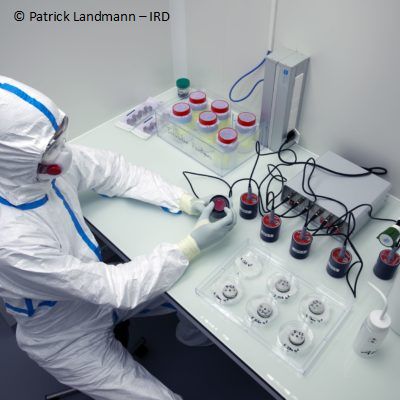Description
Material provided: Personalized training for end-users
Unit definition: 1 week of access
Biosafety Level: CL3
Installation name: Vectopole at IRD, Montpellier, France
Website: MIVEGEC
Description of the facility
The Vectopole is a platform located on the IRD campus in Montpellier France dedicated to the study of vectors and the pathogens they transmit. 550 m² of workspace are available, including fully-equipped secure CL2 and CL3 insectaries and labs for vector behaviour and insecticide resistance surveys. The lab is a WHO Reference center for the use of insecticides in Public Health. The facility includes 85 m² of insectary space in 5 rooms dedicated to insecticide bioassays, 125 m² of CL1 insectary space in 7 rooms for insect rearing and vector behavioural tests, 54 m² of CL2 confined space including 3 rooms for insect rearing and 2 labs and 62 m² of CL3 confined space including 2 rooms for insect rearing and infection, 2 rooms for experiments with small vertebrate hosts and 1 central lab, fully equipped for the production of arboviruses.
The Vectopole is operated by the French joint research unit MIVEGEC, grouping together 100 staff scientists (researchers and research assistants). The unit hosts the national reference centre for Leishmania and the WHO reference centre for vector resistance to insecticides.
Available vectors
Training will be conducted with INFRAVEC2-distributed Aedes albopictus and Aedes aegypti colonies established at our installation.
Course overview
A personalized (1-3 persons) 5-day theoretical and practical laboratory-based course will provide a necessary background to successfully plan, design, and conduct insect infection studies with Risk Group (RG) 2 and RG3 pathogens. The course is aimed at early career scientists, and/or applicants looking to strengthen their research capacity in this area. No prior entomology experience is required. To get the full value from the course, prior experience in working with human/animal pathogens in high biocontainment facilities is an advantage, but contact the organisers for more details if unsure.
The practical modules of the course will take place within the Biosafety Level (BSL) 2 and BSL3 insectaries. No infectious biological agents will be handled during the course.
You can combine this training with “Personalized training in insecticide testing experiments”.
Course syllabus
Theoretical modules
- legal framework for working with insects in biological containment laboratories (including national considerations);
- principles of risk assessment;
- facility design and operation;
- experimental design for vector competence studies and interpretation of the results.
Practical modules
- insect rearing in dedicated non-contained insectary and in high biocontainment laboratories;
- insect infection procedures: artificial blood-feeding, dissection and saliva collection
Equipment used
Trainees will use the following equipment:
- Biological Safety cabinet, type 2
- Climate Chamber
- Stereo microscope
- Refrigerated centrifuge
- -20°C degree freezer and refrigerator
- Refrigerated table
- Artificial feeding equipment, Hemotek
- Microinjector
For more information, please contact us.

